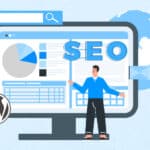Physical Address
304 North Cardinal St.
Dorchester Center, MA 02124

Brief information about WordPress Page Builders
WordPress page builders have resolved the future of website development and control. The early days of complex coding and graphic designing knowledge for building a new website. Currently, numerous WordPress page builders have the simplest and most user-friendly drag-and-drop features so that even a layman can create good and efficient WordPress websites.
The significance of selecting the best page creator for your website
Drawing the right page builder is very essential for the total achievement of the particular website. Having the right tool means less effort and time wasted, the ability to more easily implement new features on the site and just making it more enjoyable for the users. On the other hand, making a wrong decision will cause the program to fail to work well with others, be slow to operate, and frustrate the users. Hence, a lot of consideration needs to be given to the opportunities featuring out and making a careful decision on which page builder to choose according to the party’s needs and objectives.
Objectives/Aims and Topics Covered in this Article
This article seeks to offer you all the basic information you will require to make the right decisions concerning the right WordPress page builder to use on your website. In this guide, we decided to reveal the basic principles of page builders, the most important characteristics of their choice, the detailed descriptions of the well-known page builders, the comparative analysis of prices, notes on their successful application, and other useful tips. After going through this guide to the end, you should be in a better position to determine the kind of page builder that fits your website.
Table of Contents
What are Page Builders and How Do They Work?
WordPress page builder is a plugin or a set feature of the CMS that enables users to design pages on a site with ease. Such builders mostly come equipped with a drag-and-drop functionality, which allows one to easily add, position, and design various elements in a page including text, images, buttons, and forms among others. Designers do not require coding to work with page builders since they display the changes the users are making in real time.
Types of Page Builders: Informative IE, Drag-and-Drop, Block Editors, etc.
There are several types of WordPress page builders, each catering to different user preferences and needs:
Drag-and-Drop Builders: These are commonly used types of page builders. They enable clients to use their cursor to drag objects from a bar on the side and place them on the site. Some of the popular page builders are Elementor, Beaver Builder, and Divi Builder among others.
Block Editors: The very same interface, which came to WordPress with Gutenberg in version 5. 0, but the block editor is one of the key components in WordPress where writers continue to collaborate. It involves a block-based structure in which every piece of content can be a block creating an environment of flexibility that inspires design change. Having Gutenberg as the editor, WordPress has it incorporated by default.
Advantages of a Page Builder
Using a WordPress page builder offers numerous benefits:
Ease of Use: Due to this, page builders are relatively easy to use and can be used by pretty much anyone to create custom websites.
Customization: It has versatility where the user can make their designs unique without needing any coding skills.
Efficiency: Just like when following certain layouts for creating websites, page builders of course help to manage the construction procedure more efficiently and with less difficulty.
Real-Time Editing: Real-time changes can be observed by the users which enables an easier and more involving design process.
Cost-Effective: Most of the page builders are provided with either free versions or there is a more full-fledged version for purchase at a considerably low price, so users of different financial capabilities can use them.
When choosing a WordPress page builder, it’s important to consider the following key features:
User-Friendly Interface
Depending on the offered possibilities, a good page builder should have an understandable and user-friendly interface. This helps prevent a situation, where you have many tools, and when you need a particular tool, you end up spending so much time looking for it, only to find it among a pool of similar tools.
Customization Options and Flexibility
It is crucial to consider a page builder that has the throw down to the features you require in your specific business. This incorporates the element involving changing hues, typefaces, format, and other features of the product to convey your brand.
Pre-Built Templates and Blocks
Oftentimes, especially with the usage of pre-built templates and blocks, the creation of various designs can be a lot faster. It gives a blank template that you can modify and work with and thus can design professional-looking pages without taking much time.
Theme and Plugins Compatibility
Make sure that the particular page builder that you want is compatible with the various WordPress themes and plugins you intend to apply. This is useful in preventing clashes and also assists in harmonizing all components of your site.
Mobile Responsiveness
Since the usage of portable devices continues to grow, your site needs to be particularly mobile-friendly. A good page builder should enable one to be able to design and fully format a page to fit different sizes of screens.
SEO-Friendly Features
If you are engaging in marketing your business online, then search engine optimization is very important. When considering the choice of the page builder look for its SEO capabilities and potential to add meta tags, alt text to the images, and non-cluttered code.
Performance and Speed
Site builders, even more, can add their code at the top or the bottom of the most popular pages, and if they add advertising scripts that slow the loading, then the visitor will patiently wait until the page load is complete. =>Select specifically a builder that will enhance your site’s performance as this refers to the time your site takes to load.
Support and Documentation
Information is a valuable asset; therefore, customer support satisfaction and documentation are crucial. It also can assist you with some problems and indicate to you how to maximize the usage of the page builder.
Elementor
Features, Pros, and Cons
Features:
Pros:
Cons:
Ideal Use Cases
Elementor will be useful for users who need a powerful and adjustable page constructor. It is appropriate for developing absolutely any type of online presence, from basic blogging to creating enticing online stores.
Beaver Builder
Features, Pros, and Cons
Features:
Pros:
Cons:
Ideal Use Cases
To sum up, Beaver Builder is a perfect solution for agencies and developers who need a rock-solid, fast page builder. It is also useful for those users, who value clean code and performance of the site they’ve created.
Divi Builder
Features, Pros, and Cons
Features:
Pros:
Cons:
Ideal Use Cases
Divi Builder is ideal for those who will need almost complete control over the appearance and functionality of their website since it has a lot of customization tools. It’s the best tool to design visually appealing websites with distinctive design patterns.
WPBakery Page Builder
Features, Pros, and Cons
Features:
Pros:
Cons:
Ideal Use Cases
WPBakery Page Builder can be recommended to professional users and developers due to the high responsiveness of the performed operations. It is best suited to most complicated and customized websites which would be attractive to visitors or users.
Gutenberg (WordPress Block Editor)
Features, Pros, and Cons
Features:
Pros:
Cons:
Ideal Use Cases
Gutenberg is suitable for users most appropriate for users who want a simple page-creation tool. It is suitable for basic elementary blogs and websites that do not require other additional features for modification.
Free vs. Premium Versions
As has been observed most of the page builders that can be used are normally availed in trial versions or stream versions and the paid or professional versions. Sometimes, in this case, components of the free versions are fairly basic, and things that are peculiar to paid versions are locked. Depending on how innovative the person is and the specifications that need to be added to the tracking software then this is a yes or no answer.
Cost Considerations for Small vs. Large Websites
For small websites, free or lower-tier premium plans may suffice. Larger websites or businesses with complex needs might benefit from higher-tier plans that offer more features and support.
Value for Money: Features vs. Price
When evaluating pricing, consider the value for money. Look at the features offered in each plan and determine if they justify the cost. Sometimes, a slightly more expensive plan can offer significantly more value.
Pros and Cons of Different Page Builders: Real Examples of the Web Resources
Example 1: Sample website for a small business using Elementor
One of the local bakeries employs Elementor to design a beautiful and practical website. The drag-and-drop feature enables them to present their products and organize the content without difficulties.
Example 2: ECommerce site based on divi builder
An online clothing store employs the use of the Divi Builder to make the overall appearance of the store and specifically, the layout of the clothes very appealing. That is why they can offer broad possibilities of site customization to make it stand out among counterpart sites.
From Clients and Consumers
User 1: Elementor
I have now switched to Elementor in creating my websites and I find it easy to use and so powerful with the provision of almost every feature related to design.
User 2: Beaver Builder
For client work I always use Beaver Builder, it is stable, generates very clean code and its team is very helpful.
Understanding Some of the Things That Worked and Those That Did Not
From user experiences and case studies, several best practices emerge:
Test before committing: To this end, it may be helpful to begin with the free or trial versions/demos of the builder.
Prioritize performance: Select a builder that does not impact your site’s performance or slow down your site.
Leverage templates: It is recommended to use templates regularly since they can be created in advance, and thus the designs will be more personalized and quality.
Stay updated: Update your page builder and other plugins which you use to support this function, to ensure you do not encounter compatibility issues and to enhance security.
Understanding Your Website Requirements and Objectives
First, it can be necessary to define what particular requirements of the website you will address. Many aspects come into play in choosing between hosted services and external Hadoop services and some of them are the type of content that you will be producing, the Degree to which customization is needed, and the Target customer.
Examining Demos and Free Software Versions
When deciding it is advisable to use tests, demos, or freeware to try each page builder. This should help you to get a general impression of how one looks and works; and what features they include.
The following criteria relate to the Learning Curve and Ease of use:
Think about the extent to which each page builder’s features are easy to both, learn, and implement. There are software programs that are relatively difficult to learn while there are those that are relatively more easy to learn.
Comparing the results with your existing hub configuration
Make sure the page builder you are to use is suitable for your current theme and plugins. This will eliminate cases of rivalry and also enhance the effective running of the organization.
Further Scaling and Future Growth
Taking into account the long-term development of the website. Select the page builder that can answer your current needs while anticipating how it can grow with your additional features.
Best Practices for Building Pages Efficiently
Leveraging Templates and Pre-Designed Blocks
Customizing to Match Your Brand Identity
Optimizing for Speed and Performance




